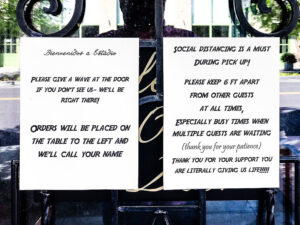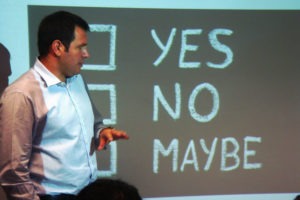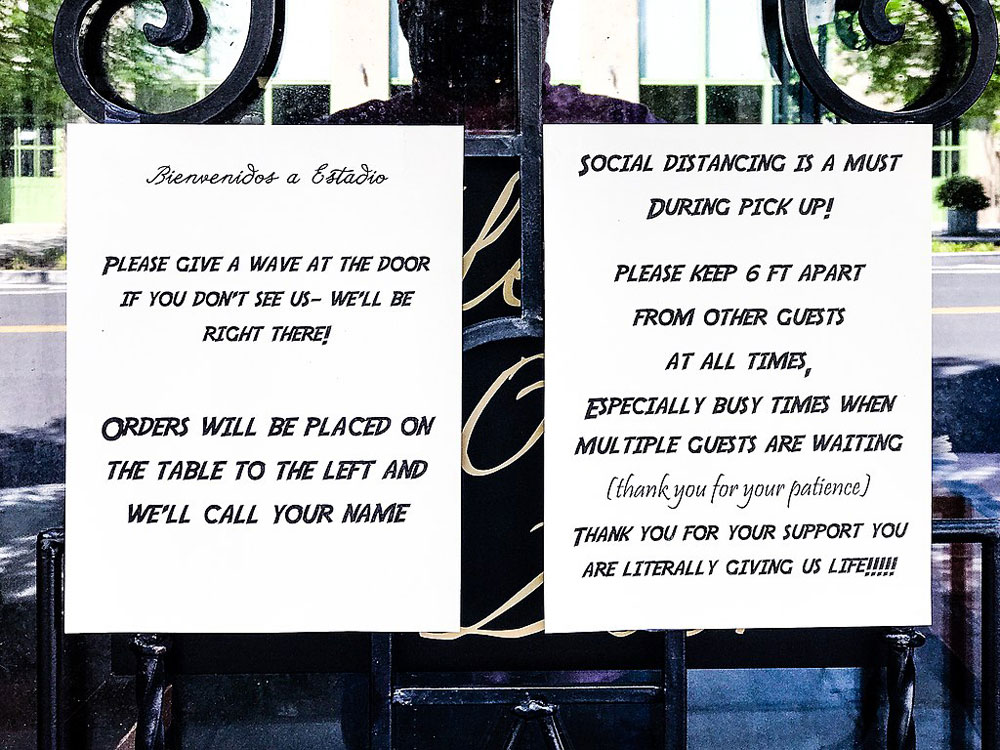The governor’s schemes for getting a payday out of finding a replacement for Obama included wrangling a highly paid nonprofit or foundation job for himself as a quid pro quo, as the federal complaint describes in journalist-pleasing detail from taped conversations with his aides (including also-indicted top aide John Harris) and other interesting interlocutors:
- “HARRIS suggested that the President-elect could make ROD BLAGOJEVICH the head of a private foundation. ROD BLAGOJEVICH told HARRIS that he should do ‘homework’ on private foundations ‘right away.’” (p. 58)
- “ROD BLAGOJEVICH asked whether he could get a high-ranking position at the Red Cross. HARRIS stated that ‘it’s got to be a group that is dependent on [the President-elect],’ and that a President probably could not influence the Red Cross. ROD BLAGOJEVICH told HARRIS to ‘look into all of those.’” (p. 58)
- “On November 5, 2008, ROD BLAGOJEVICH talked with JOHN HARRIS and Deputy Governor A. They discussed potential private foundations with which ROD BLAGOJEVICH might be able to get a position in exchange for filling the Senate seat and, in particular, those foundations that are ‘heavily dependent on federal aid’ and which, therefore, the White House would have the most ‘influence’ on. ROD BLAGOJEVICH wanted to know how much the positions being discussed pay.” (p. 58)
- “On November 5, 2008, ROD BLAGOJEVICH talked with Advisor A about the Senate seat. During the phone call, ROD BLAGOJEVICH stated that the President-elect can remove somebody from a foundation and give the spot to ROD BLAGOJEVICH. In regards to the Senate seat, ROD BLAGOJEVICH stated ‘I’ve got this thing and it’s fucking golden, and, uh, uh, I’m just not giving it up for fuckin’ nothing. I’m not gonna do it. And, and I can always use it. I can parachute me there.’” (p. 59)
- “ROD BLAGOJEVICH raised the issue of the 501(c)(4) organization and that contributors and others can put ‘10 to 15 million in it so I can advocate health care and other issues I care about and help them, while I stay as Governor, she’s (believed to be Senate Candidate 1) a Senator.’ ROD BLAGOJEVICH noted that the President-elect can ask Warren Buffett, Bill Gates, and others for money for the organization. ROD BLAGOJEVICH states he will ask ‘[Senate Candidate 6]’ to help fund it as well. HARRIS said that funding the 501(c)(4) would be a lot easier for the President-elect than appointing ROD BLAGOJEVICH to a position. ROD BLAGOJEVICH said, ‘They could say ‘hey, we get [Senate Candidate 1]. Let’s help this guy have a 501(c)(4) issue advocacy organization. Let’s fund it to the level that he’s asked for and then we’ll get [Senate Candidate 1].’ ROD BLAGOJEVICH said that he will control the 501(c)(4) organization through a board of directors while he is Governor, and then a position in the 501(c)(4) would be waiting for him when he was no longer Governor.” (pp. 68-69)
Blagojevich may be establishing levels of corruption unmatched since Jack Abramoff’s screwing his lobbying clients and William Jefferson’s stashing of $40,000 in payoffs in his freezer, matched only by his brazenness in talking loudly—to other people too—when he must have suspected FBI monitoring after 5 years of federal investigations. But Blagojevich was smart enough to identify where he might, he thought, be able to manipulate President Obama into leading the governor to sources of money.
We strongly doubt that Obama or his team of closest advisors (like Valerie Jarrett, rumored to be “Candidate No. 1” in the complaint) would have traded favors with the likes of this gubernatorial scum sitting in Springfield, Illinois, and other rumored anonymously numbered “candidates” in the complaint (such as Congressman Jesse Jackson, Jr., reportedly “Candidate No. 5”, state Attorney General Lisa Madigan, “Candidate No. 2”, and deputy governor Bob Greenlee, “Candidate No. 4”, who quickly resigned after the Blago arrest) are denying any involvement (and Madison may be preparing papers to declare the governor “unfit” to continue in office).
But Blagojevich’s targeting Obama to leverage favors from nonprofits, foundations, and donors constitutes a little lesson for foundations, no less so than the lessons to have been learned from Abramoff’s and others’ efforts to game the charitable sector.
First and foremost, keep a little distance from the pols. That doesn’t mean to write off the public sector. To the contrary! It means that nonprofits and foundations have to maintain their critical posture toward government and corporations—even the ones they like—in order to protect their status as a “third sector” that monitors and critiques the occupants of major city, state, and federal elected and appointed jobs.
In the view of the likes of Blagojevich, foundations were little more than another interest group with accumulations of wealth that the president-elect had in his pocket and could use at his pleasure. Even for foundation CEOs who think—personally—that Barack Obama is exactly the right man for the right time in our society after the disastrous maladministration of George W. Bush, this sector cannot permit itself to be seen as handmaidens to anyone. Just because our nation has finally disgorged itself of Bush is absolutely no reason at all to drop our sector’s critical posture. President Obama needs the nonprofit sector’s critical posture.
Sign up for our free newsletters
Subscribe to NPQ's newsletters to have our top stories delivered directly to your inbox.
By signing up, you agree to our privacy policy and terms of use, and to receive messages from NPQ and our partners.
But Blagojevich, the prototype of a favor-trading politician, strangely assumed that the president elect could simply call up his foundation buddies and get him a $250,000 to $300,000 sinecure there as though a top foundation job were simply another job description in the “plum book” of presidential appointments. Despite their eagerness to get on the inside of the Obama administration (for their own interests—new incentives for charitable giving, opposition to notions of targeting charitable giving to the poor, avoiding governmental monitoring of foundations’ racial/ethnic practices re grantmaking, etc.), the foundation trade association (the Council on Foundations) and individual foundations themselves ought to make it clear to lurking Blagojevich types that they are beholden to no politician.
One has to guess at what foundations Blagojevich imagined in Obama’s hip pocket. The hint is in the corrupt governor’s reference to getting Bill Gates and Warren Buffett to fund him at the helm of a 501(c)(4), perhaps linked to a position he thought he could get out of SEIU chief, Andy Stern, maybe even serving as head of Stern’s “Change to Win” coalition alternative to the AFL-CIO. In picking Gates and Buffett, Blagojevich was obviously picking money, but his feel for Gates was philanthropy. In both 2007 and 2008, Blagojevich’s office distributed press releases touting his partnership with the Gates Foundation to create the “College and Work Readiness Partnership”. What this partnership actually meant to Blagojevich in policy terms is anyone’s guess, but Blagojevich obviously knows money.
Politicians love to stick their faces into press releases announcing nonprofit and foundation programs when it serves their purposes, giving them credit for having merely nodded permission to an idea generated by city government and foundation staff with little involvement from the government’s chief executive. Foundations ought to be smart about not letting themselves be used for political promotions as a trade-off for getting political access and approval, especially with the likes of Blagojevich, whose unsavory reputation has been a subject of public discussion (at least in and around Chicago and Springfield) for some years.
The fact that the Illinois governor assumed that Obama could give him the Red Cross seat should also concern the sector. It isn’t a matter of whether Blagojevich had been led to believe that Obama might and could do this, but it is the notion that pols of Blagojevich’s sort may well believe that nationally Congressionally chartered nonprofits like the ARC were part of their political spoils to allocate. Of course, Blagojevich was so sloppy in his thinking that he classified the ARC as a foundation, but that’s of no consequence. Too many politicians the editor of CR has worked with would classify 501(c)(3)s by their assets, not by their function, and in the sleaziest cases like Blagojevich, envision them as targets of opportunity, not instruments of philanthropy and social progress. That is why even for the federally chartered groups, maintaining the independence of the nonprofit sector from government, whether the White House occupant is Bush or Obama, should be paramount.
Most people in philanthropy take themselves and their work quite seriously, but for all too many politicians, foundations are simply dollar signs plus elite connections, capital institutions built on tax exempt money that they can leverage into their programs, or in the cases of the likes of Blagojevich, their own pockets. It’s fine for foundations to work somewhat closely with the public sector on new program initiatives, to resuscitate and build the public sector’s capacities after 8 years of intentionally denigrated and downgraded treatment by the powers that be. But that attention can be flattering and unproductive, and should not be at the expense of philanthropy’s and the entire nonprofit sector’s preservation of its critical “third sector” stance toward government and business.













